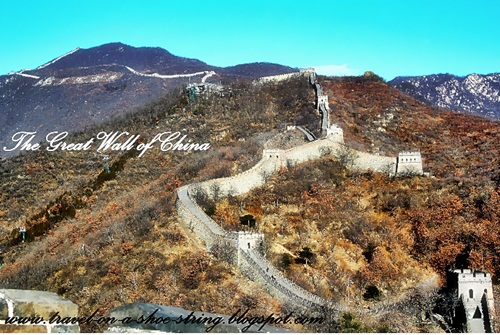Address: No.4 Jingshan Front Street,Dongcheng District 65132255
Opening Hour: 8:30-17:00
Time for the last ticket to be sold: 3:00 pm
Travel Time: two hours
Entrance Fee: RMB 60
How to get there:
By Bus
No. 1, 2, 4, 5, 10, 20, 52, 57, 22, 54, 101, 103,109, 111, 120, 802, special No.1 bus and get off at Zhongshan Phongshan Park stop or Tian Am Men stop.
By Subway
Subway line 1 & 2: get off at Tiananmen west station or Tiananmen east station.
The Forbidden City was declared a World Heritage Site in 1987, and is listed by UNESCO as the largest collection of preserved ancient wooden structures in the world.
literally "Purple Forbidden City").
The Forbidden City is the world's largest palace complex, covering 720,000 square meters with 800 buildings and 9,000 rooms in total. It was the home to 24 emperors during the Ming and Qing dynasties, and is recognized as one of the most attractive five palaces in the world (the other four are: the palace of Versailles in France, Buckingham Palace in the UK, the White House in the US and the Kremlin in Russia).
We entered the Forbidden City from the Tian'anmen Gate. Through the gate, across an expansive brick - paved square, we reached the main entrance to the palace, the Meridian Gate (Wumen in Chinese). The Meridian gate was the place where the Emperor announced the new lunar calendar on the winter solstice.
The outer court is made up of three main buildings:
- The Hall of Supreme Harmony (Taihedian)
- The Hall of Central Harmony (Zhonghedian)
- The Hall of Preserving Harmony (Baohedian).
Out from the Hall of the Preserving Harmony, you will notice a huge block of marble carved with cloud and dragon designs. Go straight, and you will see another gate, called Gate of Heavenly Peace(Qianqingmen). This is the main gateway to the inner living court.
The inner court is composed of the three main structures at the rear of the Forbidden City, namely the
- Palace of Heavenly Peace (Qianqinggong),
- the Palace of Union and Peace (Jiaotaidian)
- Palace of Terrestrial Tranquility (Kunninggong).
The first structure inside the inner court is the Palace of Heavenly Peace, the emperors' sleeping quarters. Behind it is the Palace of Union and Peace, where the imperial seals were stored. The third hall is the Hall of Terrestrial Tranquility, the emperors' wedding room. Exiting and going further north, travelers will find the Imperial Garden. The garden offers an aesthetic change from the crimson and gray building complex to a colorful and luxuriant atmosphere. On the left side of the inner court, travelers will find the Mental Cultivation Hall(Yangxindian), the most important building except for the Hall of Supreme Harmony. From the time of the third emperor, Yongzhen, all the Qing emperors, 8 in total resided in this hall. The palaces on the eastern and western sides, the former residences of the concubines have been converted into exhibition halls.
The main exit gate of the Forbidden City is the Gate of Divine Might, behind the Imperial Garden.
For security the Forbidden City is enclosed by a 10 meter high city wall, which has a circumference of 3, 430 meters. At each corner of the Forbidden City, there stands a magnificent watchtower, which was heavily guarded in the past. Around the city there is a moat as the first line of defense.
Weather/Best Time to Go
The autumn months between September and November have the best weather and fewer tourists. Summer (June to August) is considered peak season, when hotels typically raise their rates and the Great Wall nearly collapses under the weight of marching tourists. Spring is less pleasant not many tourists but lots of wind and dust. In winter, you'll have Beijing to yourself and many hotels offer substantial discounts, just remember it's an ice box outside. Everything is chock block during the Chinese New Year (usually in January or February).
The best tourist season to Forbidden City is from late March to early June and from late August to late November. During these periods, choose someday not on the weekdays and holidays to avoid the crowds of people.




















